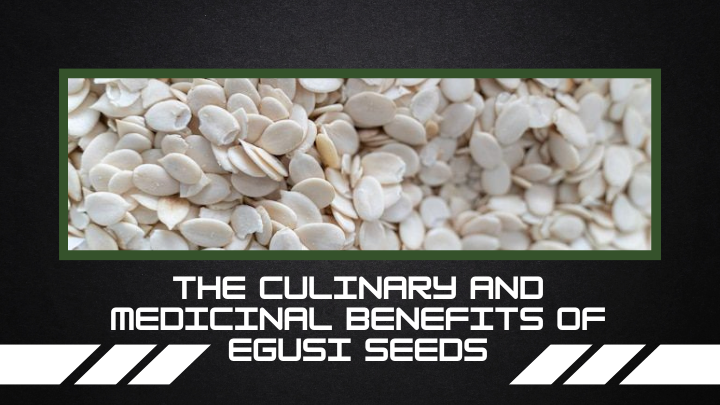Egusi Seeds
Egusi seeds, derived from the melon plant (Citrullus lanatus) native to West Africa, are a staple ingredient in many traditional African dishes. While these seeds are commonly recognized for their use in hearty, flavorful stews, they also offer impressive nutritional and medicinal benefits. Rich in essential nutrients such as protein, healthy fats, and minerals, egusi seeds play an important role in promoting heart and muscle health. In this article, we’ll delve into the culinary uses of egusi seeds and explore their potential health benefits, particularly for the cardiovascular system and muscles.
What Are Egusi Seeds?
Egusi seeds are the edible seeds of the melon plant, which is often called the “egusi melon” in West Africa. The seeds are typically harvested from a type of melon that resembles a watermelon, although they are smaller in size and have a hard, white, or light-colored outer shell. After being dried and hulled, the seeds reveal a pale, ivory-colored interior that can be ground into a powder or used whole in various dishes.
In West African cuisine, egusi seeds are primarily used as a thickening agent in soups and stews, giving the dish a rich, nutty flavor and a creamy texture. They are often ground into a paste and added to a variety of traditional dishes, such as egusi soup (a savory dish made with ground egusi seeds, vegetables, meats, or fish), egusi stew, or pounded yam.
Culinary Uses of Egusi Seeds
Egusi seeds are incredibly versatile in the kitchen, and they are an essential ingredient in many West African recipes. The seeds can be used in several forms—ground into a paste, roasted, or used whole—depending on the dish. Some common culinary applications of egusi seeds include:
1. Egusi Soup
Egusi soup is one of the most popular dishes in West Africa, particularly in Nigeria. The soup is typically made with ground egusi seeds, vegetables like spinach or bitterleaf, meats (goat, beef, or chicken), fish, and a variety of seasonings. The ground egusi seeds help thicken the soup, giving it a rich, hearty consistency. It is commonly served with pounded yam, rice, or fufu.
2. Egusi Stew
Egusi stew is another beloved dish in West African cuisine. In this dish, the ground egusi seeds are sautéed with onions, tomatoes, and spices to create a thick, flavorful stew. The stew is typically served with rice, plantains, or other starchy side dishes.
3. Egusi Cakes or Fritters
In some West African countries, egusi seeds are used to make savory cakes or fritters. The seeds are ground into a paste, mixed with flour, spices, and vegetables, and then fried to create crispy, delicious snacks.
4. Roasted Egusi Seeds
Roasted egusi seeds are a popular snack in West Africa. The seeds are typically roasted until golden brown and then salted. They are enjoyed as a crunchy, protein-packed snack, often served alongside other nuts and seeds.
Nutritional Benefits of Egusi Seeds
Egusi seeds are not only delicious, but they are also packed with nutrients that contribute to overall health. Below are some of the key nutritional benefits of egusi seeds:
1. Rich in Protein
Egusi seeds are an excellent source of plant-based protein. A high-protein diet is essential for building and repairing muscle tissue, as well as supporting immune function and maintaining a healthy metabolism. For vegetarians or those looking to reduce their animal protein intake, egusi seeds provide a great alternative source of protein.
2. High in Healthy Fats
Egusi seeds are rich in healthy fats, particularly unsaturated fats such as omega-6 fatty acids. These healthy fats help improve heart health by lowering bad cholesterol levels (LDL) and increasing good cholesterol (HDL). Omega-6 fatty acids also play a role in reducing inflammation in the body and supporting overall cardiovascular function.
3. Packed with Minerals
Egusi seeds are a good source of several essential minerals that support heart and muscle health, including:
- Magnesium: Magnesium is crucial for muscle function, as it helps regulate muscle contraction and relaxation. It also supports healthy nerve function and contributes to maintaining normal blood pressure levels.
- Potassium: Potassium is an important mineral for maintaining proper fluid balance in the body, as well as supporting heart health. It helps regulate blood pressure by balancing the effects of sodium and promoting healthy blood vessel function.
- Iron: Egusi seeds contain a significant amount of iron, a mineral essential for the production of red blood cells and the transport of oxygen throughout the body. Adequate iron intake is crucial for maintaining energy levels and preventing iron-deficiency anemia.
4. Rich in Fiber
Egusi seeds contain a good amount of dietary fiber, which plays a critical role in digestive health. Fiber helps promote regular bowel movements, prevent constipation, and support a healthy gut microbiome. Additionally, fiber is beneficial for managing blood sugar levels, as it slows down the absorption of sugar in the bloodstream, reducing the risk of type 2 diabetes.
5. Antioxidants
Egusi seeds are rich in antioxidants, which help protect the body from the damaging effects of free radicals. These antioxidants help reduce oxidative stress and inflammation, which are linked to chronic diseases such as heart disease, cancer, and diabetes. The high levels of antioxidants in egusi seeds help support overall health and longevity.
Medicinal Benefits of Egusi Seeds
Beyond their culinary uses, egusi seeds have long been utilized in traditional African medicine for their healing properties. Some of the medicinal benefits of egusi seeds include:
1. Supports Heart Health
The healthy fats, magnesium, potassium, and antioxidants found in egusi seeds all contribute to maintaining optimal heart health. By promoting healthy cholesterol levels, improving blood pressure, and reducing inflammation, egusi seeds may help lower the risk of cardiovascular diseases such as hypertension, heart attacks, and stroke.
2. Promotes Muscle Function and Recovery
The high protein content and presence of magnesium in egusi seeds make them beneficial for muscle health. Protein is essential for muscle growth and repair, while magnesium plays a crucial role in muscle contraction and relaxation. Including egusi seeds in your diet may help support muscle function and promote faster recovery after physical exertion or exercise.
3. Aids in Weight Management
Egusi seeds, with their high protein and fiber content, can be an effective tool for weight management. The protein helps promote satiety and prevent overeating, while fiber aids in digestion and keeps the digestive system functioning properly. Additionally, the healthy fats in egusi seeds provide long-lasting energy without the risk of weight gain associated with unhealthy, processed fats.
4. Helps Manage Blood Sugar Levels
The fiber in egusi seeds plays a vital role in regulating blood sugar levels. It slows the absorption of sugar into the bloodstream, preventing rapid spikes in blood sugar. This can be particularly beneficial for individuals with diabetes or those at risk of developing the condition.
5. Supports Bone Health
Egusi seeds are a good source of magnesium and calcium, both of which are important for maintaining healthy bones. Magnesium helps regulate calcium levels in the body and plays a role in bone mineralization, while calcium is essential for bone strength and density. Regular consumption of egusi seeds can help support bone health and prevent conditions like osteoporosis.
How to Incorporate Egusi Seeds Into Your Diet
Egusi seeds are incredibly versatile and can be incorporated into your diet in a variety of ways:
- Ground Egusi Soup: One of the most popular dishes featuring egusi seeds, this hearty soup can be enjoyed with a variety of proteins and vegetables.
- Egusi Stew: Serve with rice, plantains, or pounded yam for a filling and nutritious meal.
- Roasted Egusi Snacks: Enjoy roasted egusi seeds as a crunchy, protein-packed snack or sprinkle them over salads and dishes for added texture.
- Egusi Cakes: Combine ground egusi with spices and fry to make savory cakes or fritters, perfect for breakfast or as an appetizer.
Egusi seeds are not only a staple ingredient in West African cuisine but also offer numerous health benefits, particularly for heart and muscle health. Rich in protein, healthy fats, fiber, and essential minerals, egusi seeds provide nourishment and promote overall well-being. Whether you’re enjoying them in a traditional dish or incorporating them into your daily snacks, egusi seeds can be a valuable addition to a balanced and nutritious diet. With their versatility in the kitchen and their impressive health benefits, it’s no wonder that egusi seeds have earned their place as a beloved ingredient in African cooking.



